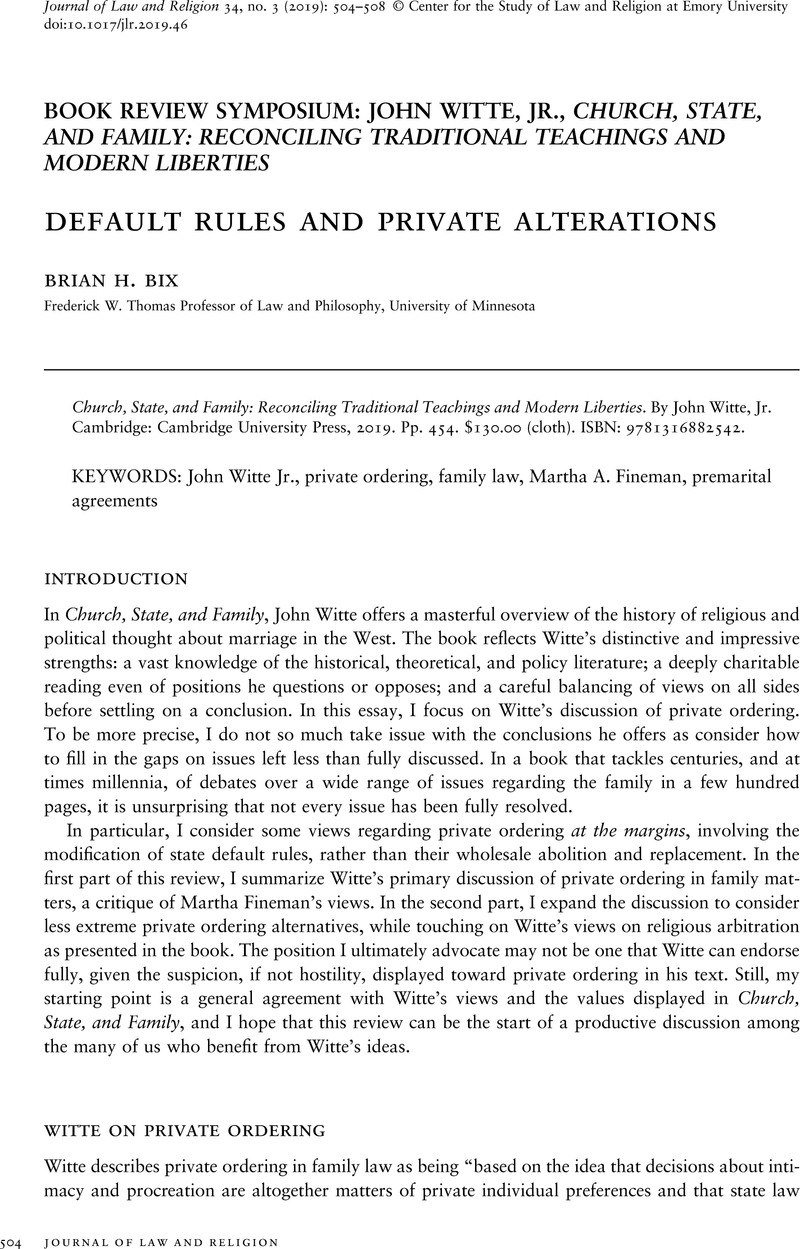No CrossRef data available.
Article contents
DEFAULT RULES AND PRIVATE ALTERATIONS - Church, State, and Family: Reconciling Traditional Teachings and Modern Liberties. By John Witte Jr. Cambridge: Cambridge University Press, 2019. Pp. 454. $130.00 (cloth). ISBN: 9781316882542.
Review products
Published online by Cambridge University Press: 20 January 2020
Abstract

- Type
- Book Review Symposium: John Witte, Jr., Church, State, and Family: Reconciling Traditional Teachings and Modern Liberties
- Information
- Copyright
- Copyright © Center for the Study of Law and Religion at Emory University 2020
References
1 See generally Martha Albertson Fineman, The Neutered Mother, the Sexual Family, and Other Twentieth Century Tragedies (Routledge, 1995)Google Scholar. As Witte points out, there is a tension between Fineman's view of caregivers as highly vulnerable and her advocacy for the simple enforcement of the agreements (actual and potential) caregivers enter (347; see also 361).
2 Obviously, this last concern applies not only to abolitionist views like Fineman's, but also to the more moderate forms of private ordering that I discuss below.
3 Here Witte is discussing Regan, Milton C., Calibrated Commitment: The Legal Treatment of Marriage and Cohabitation, 76 Notre Dame Law Review 1435 (2001)Google Scholar.
4 Covenant marriage is an alternative form of marriage provided and defined by the state. Under covenant marriage (which varies slightly across the three adopting states: see Arizona Rev. Stat. §§ 25-901; Arkansas Code Ann. §§ 9-11-801 to 9-11-811; Louisiana Rev. Stat. Ann. §§ 9:272 to 9:275), couples about to marry, or who have already married, can opt for a more binding form of marriage, where divorce is generally available only on fault grounds or after a significantly longer waiting period than is normally set. Covenant marriage also requires premarital and pre-divorce counseling. In the states that have covenant marriage, only a very small percentage of couples have chosen it.
5 A number of states introduced “domestic partnership” or “civil union” to offer a marriage alternative to same-sex couples, and, in a few states, these were also made available to some opposite-sex couples. This status is, obviously, less necessary now that same-sex marriage is available everywhere in the United States.
6 They may be reluctant but willing, fearing the interference with the new post-adoption family, but willing to do this if it makes the adoption possible; or they may be enthusiastic and willing, believing that it is in fact in the child's best interests not to lose touch entirely with the child's biological parent(s). I do not think that the type of “willing” involved affects the ultimate analysis.
7 On the rules regarding contact agreements (open adoption), see Bix, Brian H., Private Ordering in Family Law, in Philosophical Foundations of Children's and Family Law 257, 265–66 (Brake, Elizabeth & Ferguson, Lucinda, eds., Oxford, 2018)Google Scholar.
8 Of course, the situation may be more complicated. The effects of enforceability of agreements are an empirical matter that likely varies across transaction types. Consider, again, premarital agreements. There may be individuals who would prefer to marry with a predictably enforceable premarital agreement favorable to their interests but would still be willing to marry even if those agreements were unenforceable or were unpredictable in their enforceability. There is no data regarding how many or frequent such cases are, and marriage on the state default terms would obviously be preferable to marriage on the terms of a one-sided premarital agreement.
9 The rules vary significantly from state to state, with some regulatory standards creating more robust tests of fairness than others, but arguably all (or nearly all) create significant minimum standards to protect the most vulnerable. See generally Brett R. Turner & Laura W. Morgan, Attacking and Defending Marital Agreements 361–449 (2nd ed., American Bar Association, 2012)Google Scholar.
10 See Bix, supra note 7.




